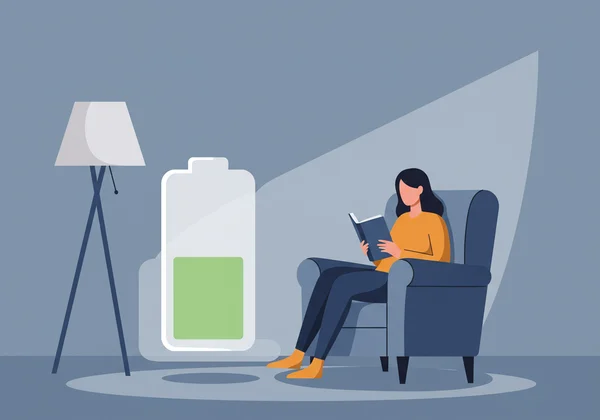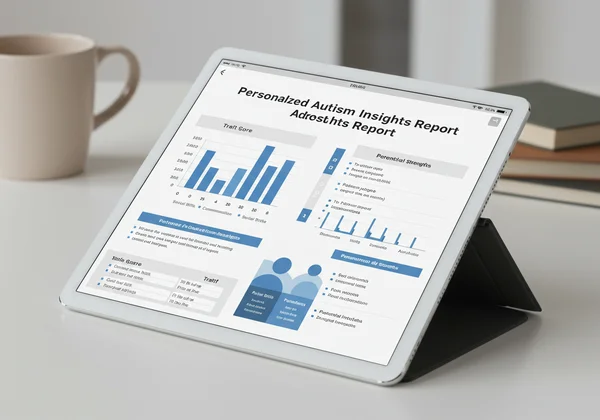AQ Test for Women: Unmasking Female Autism Traits
August 17, 2025 | By Eliza Finch
Have you ever felt like you're speaking a slightly different language than everyone around you, but the typical descriptions of autism don't quite fit? Many women share this experience, navigating the world feeling misunderstood or out of sync. If you've wondered why you perceive things so deeply or why social interactions leave you drained, you're not alone. This guide is for you. We'll explore the unique ways autism can present in women and how an AQ test for women can be a private, no-pressure first step toward understanding. The journey to self-discovery can start with a single click, and an online autism screening can provide the initial insights you've been searching for.
Understanding Autism in Women: The Invisible Spectrum
For decades, the model for autism was based almost exclusively on studies of boys and men. This has created a significant gap in understanding, leaving countless women and girls undiagnosed and unsupported. The traits often associated with autism—such as visible repetitive behaviors or overt social difficulties—don't always capture the female experience. This is because the presentation can be much more subtle and internalized.

Why traditional diagnostic models often miss girls
Traditional diagnostic criteria were not designed with girls in mind. Clinicians historically looked for external behaviors that were more common in autistic boys. Girls, often socialized differently, may not exhibit these "classic" signs. As a result, they are frequently misdiagnosed with anxiety, depression, or personality disorders, while the underlying neurotype goes unrecognized. This can lead to years of feeling like something is "wrong" without knowing why.
The difference between internalized vs. externalized traits
Autism in boys often manifests through externalized traits, such as physical hyperactivity or noticeable meltdowns. In girls, the experience is frequently internalized. Instead of an outward disruption, they might experience intense internal anxiety, engage in constant self-monitoring, or have emotional shutdowns that are invisible to others. This quiet struggle is just as real and challenging, but it is far less likely to be identified by parents, teachers, or even doctors.
How social expectations shape female experiences
From a young age, girls are often under immense societal pressure to be agreeable, socially adept, and emotionally intuitive. To fit in, many autistic girls learn to suppress their natural tendencies and camouflage their traits. They may force eye contact even when it's uncomfortable or mimic the social behaviors of their peers. This constant performance is a survival strategy, but it comes at a significant cost to their mental health and sense of self.
The Reality of Autism Masking and Its Impact
One of the most critical concepts for understanding autism in women is masking, also known as social camouflaging. It's a complex, often subconscious strategy used to hide autistic traits to appear more neurotypical. While it can help with social survival, it is an exhausting and unsustainable act that can have severe consequences for a person's well-being.

What is social camouflaging?
Social camouflaging involves consciously or unconsciously suppressing natural responses and performing neurotypical ones. This can include forcing facial expressions, manually controlling body language, pushing through sensory overload, and carefully scripting conversations ahead of time. It is a constant mental calculation aimed at avoiding judgment, bullying, or social rejection. For many autistic women, masking is so ingrained that they may not even realize they are doing it until they reach a point of complete exhaustion.
Examples of masking in daily life
Masking can appear in many subtle ways. It might be the effort spent mimicking a colleague's casual small talk by the coffee machine, even when it feels unnatural. It could be forcing oneself to stay at a loud, crowded party long after the "social battery" has died. Other examples include practicing conversations in the mirror, developing a repertoire of "standard" responses to common questions, or feigning interest in topics that are popular but hold no personal appeal. Each of these acts drains precious energy.
The link between masking and autistic burnout
The long-term consequence of constant masking is often autistic burnout. This is a state of profound physical, mental, and emotional exhaustion, often accompanied by a loss of skills. After years of suppressing their authentic selves, many autistic women find they can no longer keep up the performance. Burnout can manifest as increased sensory sensitivity, extreme fatigue, a complete withdrawal from social life, and an inability to perform daily tasks. Recognizing the signs of masking is a crucial step toward preventing this debilitating state. If this sounds familiar, it may be time to explore your traits in a safe environment.
7 Common (But Often Overlooked) Female Autism Traits
While every autistic person is unique, research and anecdotal evidence highlight several female autism traits that are frequently overlooked. Recognizing these can be an empowering "aha!" moment for many women.
-
Intense, specialized interests While the stereotype might be an interest in trains or computers, an autistic woman's special interests are often considered more "socially acceptable." They might include literature, psychology, history, animal welfare, or a specific art form. These aren't just hobbies; they are deep, passionate areas of expertise that provide joy, comfort, and a sense of purpose.
-
Deep empathy and emotional perception The myth that autistic people lack empathy is profoundly untrue. Many autistic women experience a form of hyper-empathy, feeling the emotions of others so intensely that it becomes overwhelming. They may be incredibly attuned to injustices and the suffering of others, but they might struggle to process and express these powerful feelings in a neurotypical way.
-
Chronic social exhaustion (the "social battery") After social events, many women feel a need to "recharge." For autistic women, this is a much more profound experience. Socializing requires constant analysis, prediction, and masking, which drains their "social battery" far more quickly than their neurotypical peers. This often leads to a need for significant alone time to recover from what feels like a social hangover.

-
A strong sense of justice and fairness Many autistic women possess an unshakeable sense of justice. They are often the first to speak up against unfairness, challenge illogical rules, or defend the underdog. This trait can make them powerful advocates, but it can also lead to conflict in environments where others prefer to "go with the flow."
-
Sensory sensitivities Sensory sensitivities are a core part of the autistic experience. For women, this might manifest as an aversion to certain clothing textures (like scratchy tags or seams), a low tolerance for bright lights or loud, overlapping sounds, or a heightened sense of smell. These are not mere preferences; they are neurological responses that can cause genuine discomfort or pain.
-
Reliance on logic and patterns Autistic minds are often skilled at pattern recognition and logical thinking. An autistic woman might find comfort in systems, data, and predictable routines. She may approach problems methodically and excel in fields that require detailed analysis. This logical approach can sometimes be misinterpreted as cold or detached by those who rely more on social nuance.
-
A rich, detailed inner world Many autistic women have a vibrant and complex inner world. They may be avid daydreamers with elaborate internal narratives or a deep capacity for imagination. This inner world serves as a refuge from an often confusing and overwhelming external world. It's a private space for processing thoughts, rehearsing situations, and exploring interests without judgment.
How Our AQ Test for Women Provides Insight
Reading about these traits can be illuminating, but you may still be wondering, "Does this apply to me?" This is where a structured tool can help. The Autism Spectrum Quotient (AQ) test, developed by Simon Baron-Cohen at Cambridge University, is a scientifically validated screener designed to measure autistic traits in adults. Our free AQ test online offers a private and accessible way to explore where you might fall on the spectrum.
A tool for self-discovery, not diagnosis
It is crucial to understand that our AQ test is a tool for self-discovery, not a clinical diagnosis. A formal diagnosis can only be given by a qualified healthcare professional. However, taking a screening test can be an incredibly valuable first step. It can validate your experiences, give you a new language to describe your inner world, and provide the data you need to decide if pursuing a formal assessment is right for you. Start your self-discovery journey with confidence.
What your AQ score can tell you
After completing the 50-question assessment, you will receive an instant AQ score. This score provides a quantitative measure of your autistic traits across five key areas: social skills, communication, imagination, attention to detail, and attention switching. Seeing your results can help you identify specific areas where your experiences align with common autistic traits, providing a framework for your self-understanding.
Go beyond the score with our AI-powered report
While an AQ score is a useful data point, it’s only the beginning. Our platform offers a unique feature that sets us apart: an optional, AI-powered personalized report. By answering a few additional background questions, you can unlock a detailed analysis that goes far beyond a single number. This AI-powered report interprets your unique profile of traits, highlighting potential strengths, identifying possible challenges, and offering actionable insights tailored to your personal experience. It transforms a simple score into a guide for personal growth.

Find Your Clarity and Live More Authentically
Unmasking female autism traits is a journey of self-compassion and validation. For too long, women have been left out of the conversation, their experiences invalidated or misunderstood. Recognizing that your intense interests, deep empathy, and need for solitude are not character flaws but potential signs of a different neurotype can be life-changing. It’s the first step toward living more authentically.
If this article resonates with you, you don't have to wonder anymore. The path to understanding begins with a single, simple action. You can gain valuable insights in a safe, private, and supportive environment.
Ready to explore your own traits? Take our free AQ test today and get the insights you've been looking for.
Frequently Asked Questions About the AQ Test and Women
How do the signs of autism differ in women vs. men?
The signs of autism in women are often more internalized. They are more likely to involve social camouflaging (masking), intense but socially "acceptable" special interests, and internal emotional struggles like anxiety, rather than the more externalized behaviors sometimes seen in men. This subtlety is why autism in women is often missed.
Is the AQ test an accurate screening tool for women?
Yes, the AQ test is a widely used and scientifically validated screening tool for adults, including women. While no screener is perfect, it is designed to measure the quantity of autistic traits an individual possesses. For many women, taking the test is a pivotal moment of validation that confirms their lifelong feelings of being different. You can try the AQ test to see what insights it offers you.
What should I do after getting my AQ test score?
Your AQ score is a starting point for self-reflection. Use it to learn more about the specific traits it highlights. Our optional, personalized AI report can offer deeper insights and practical advice. If your score and experiences suggest you might be autistic, you may choose to connect with autistic communities online or consider seeking a formal diagnosis from a professional specializing in adult and female autism. Remember, this test is a resource for understanding, not a medical diagnosis.